Charles E W Bean, Diaries, AWM38 3DRL 606/276/1 - 1928-1937 - Part 9
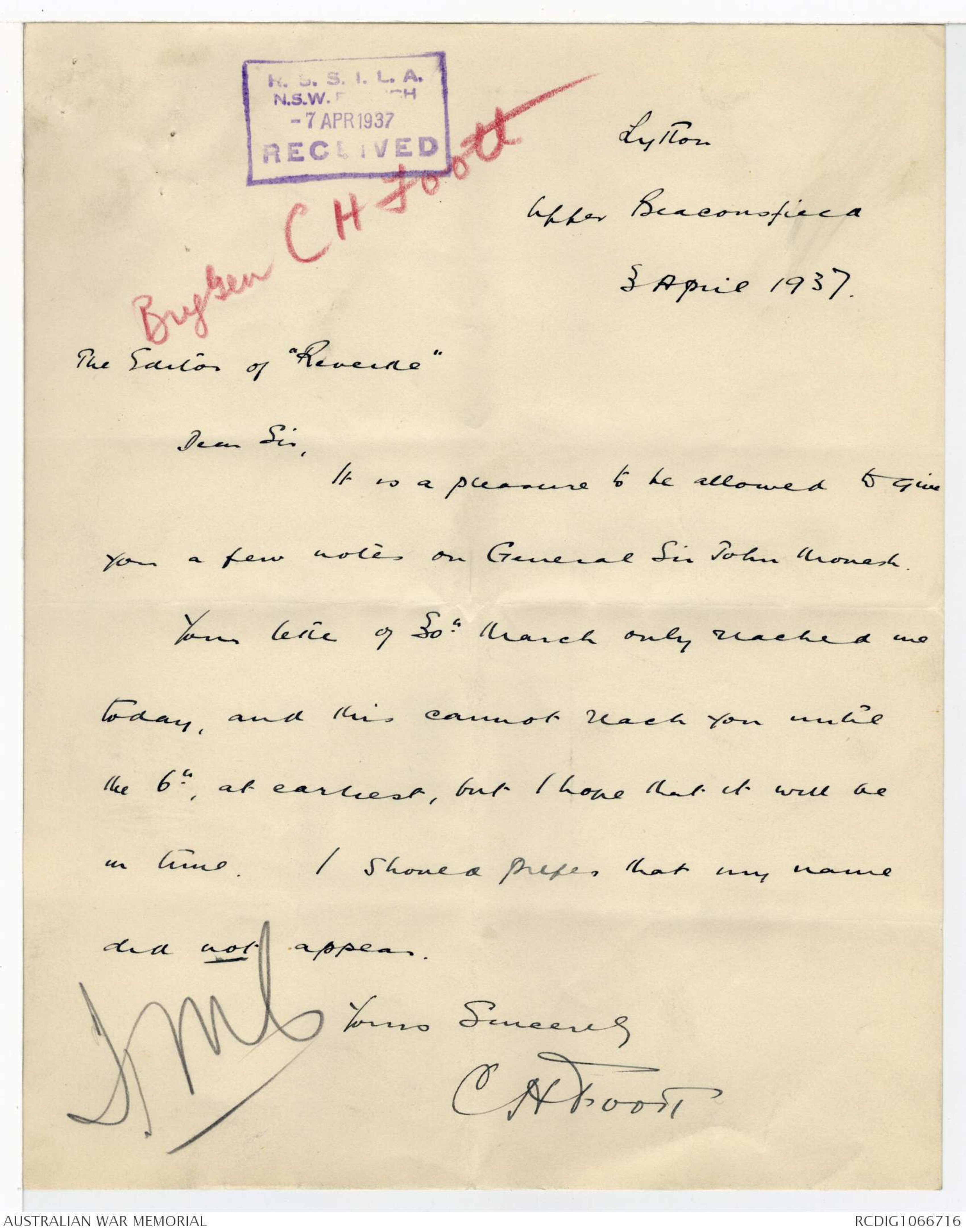
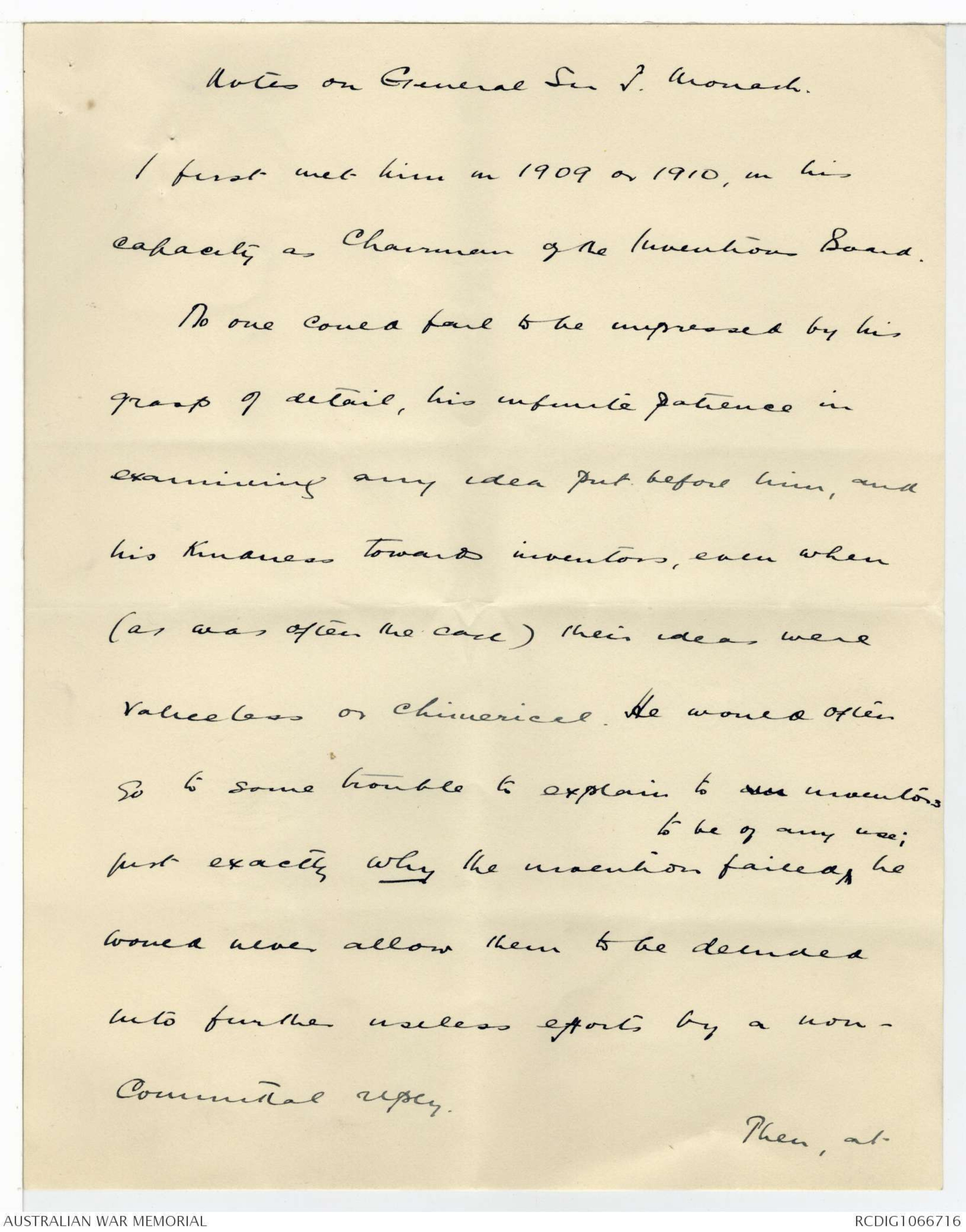
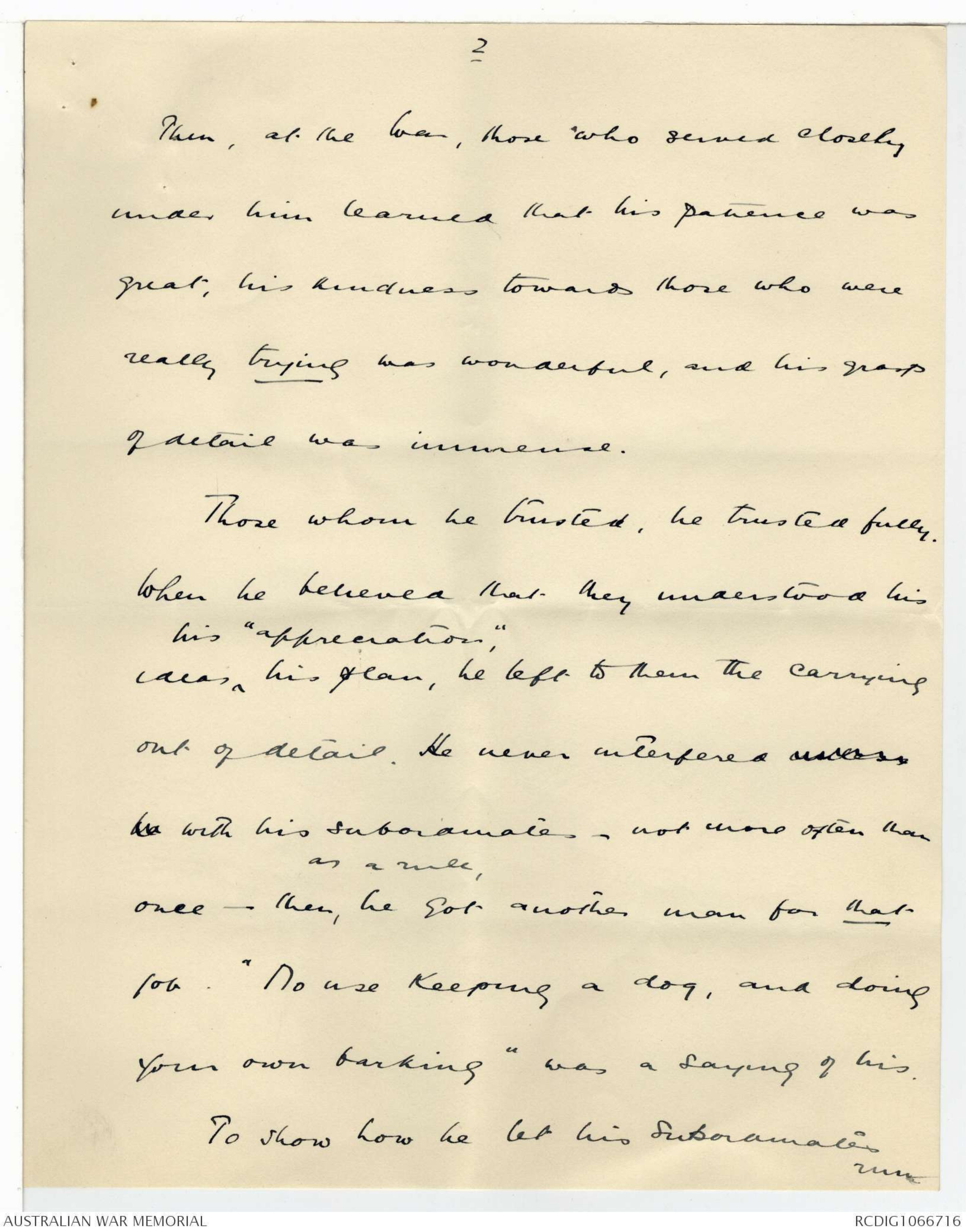
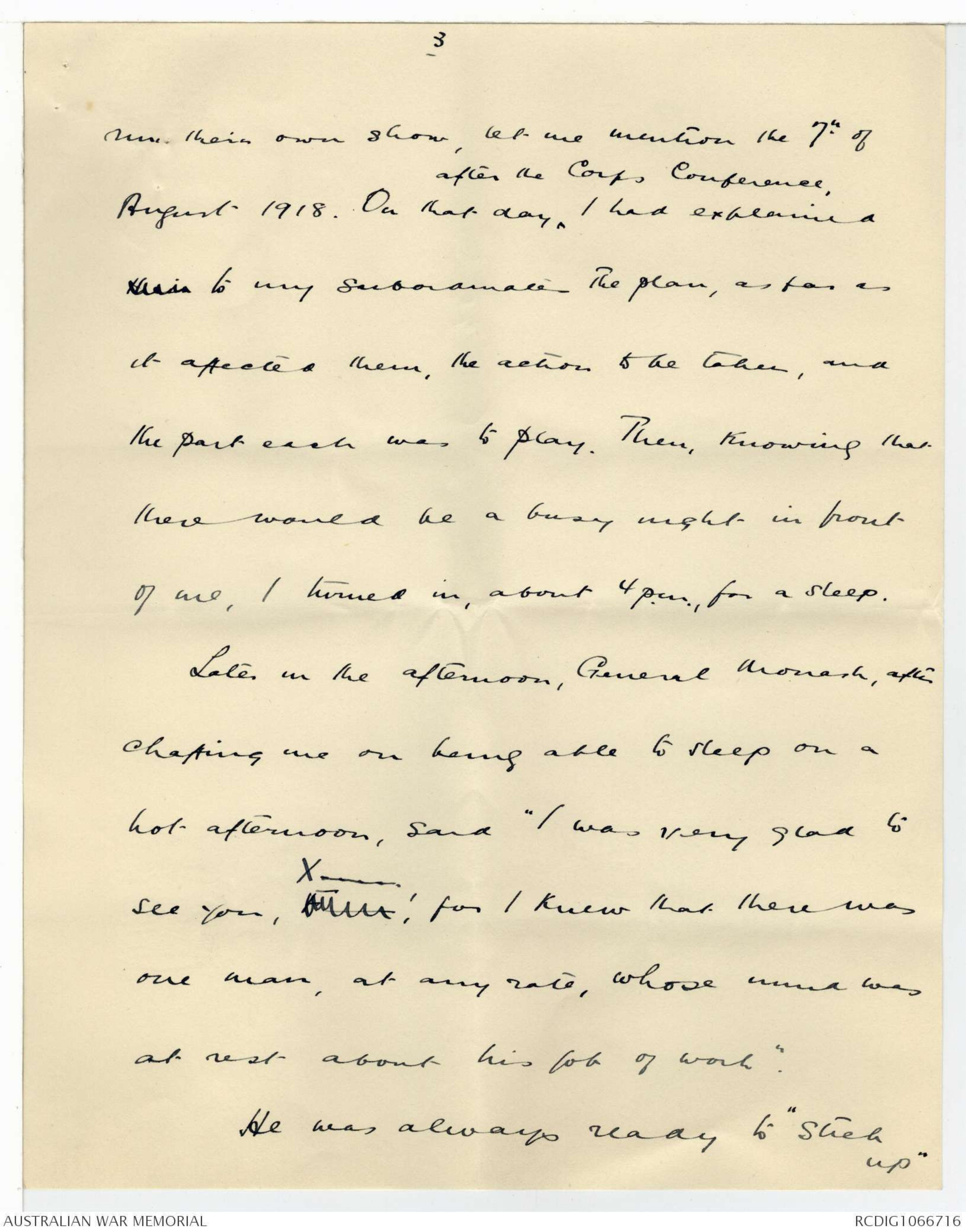
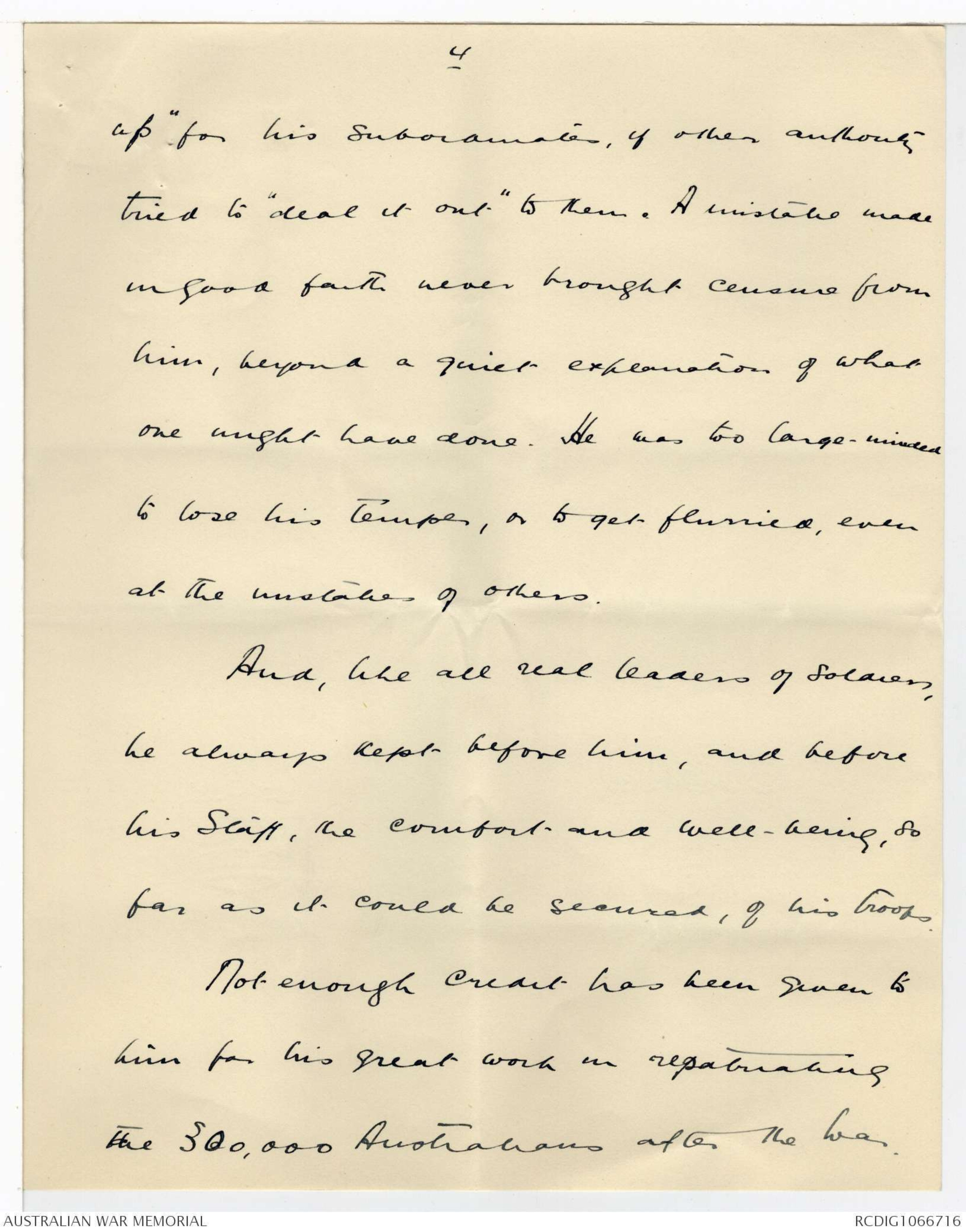
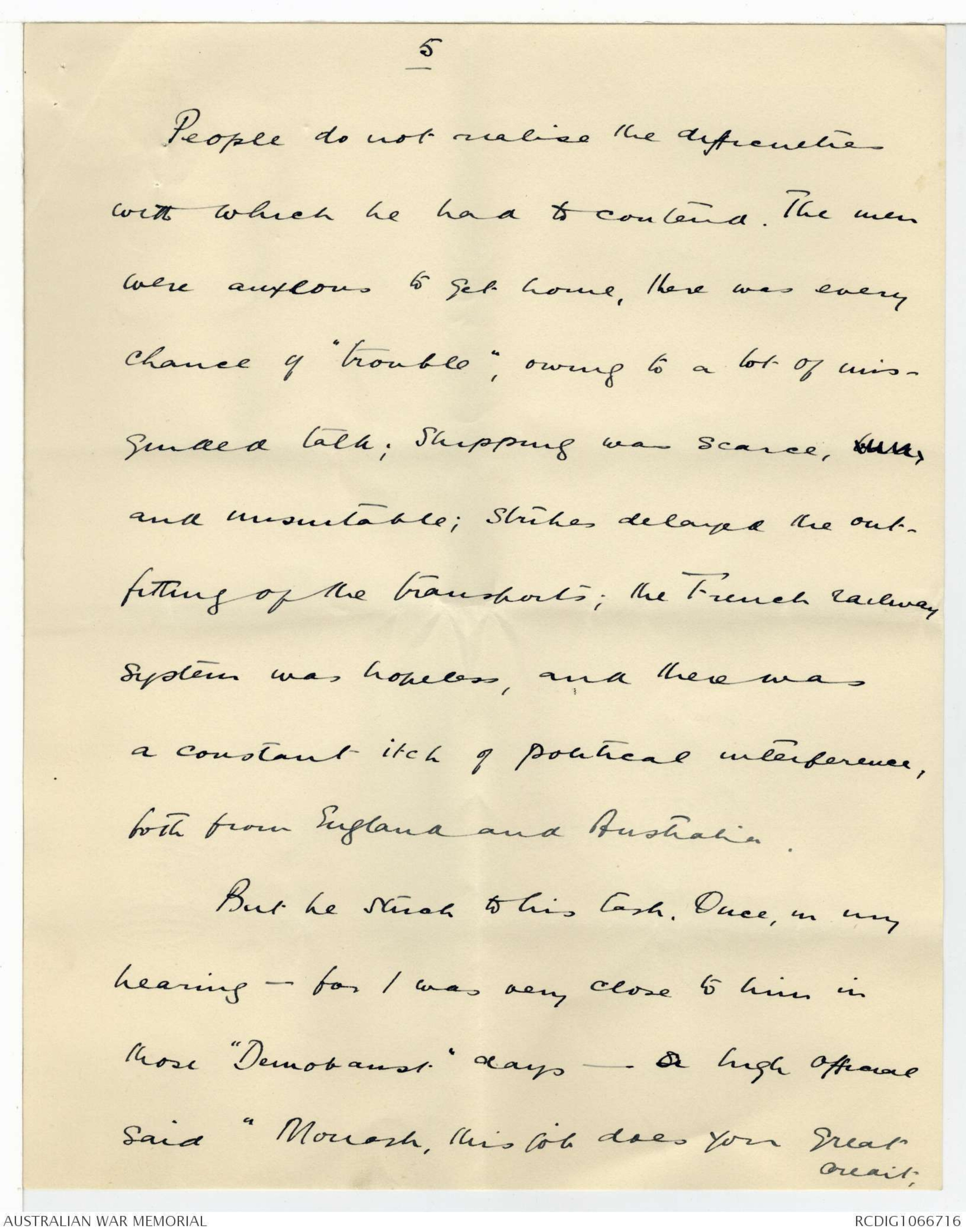
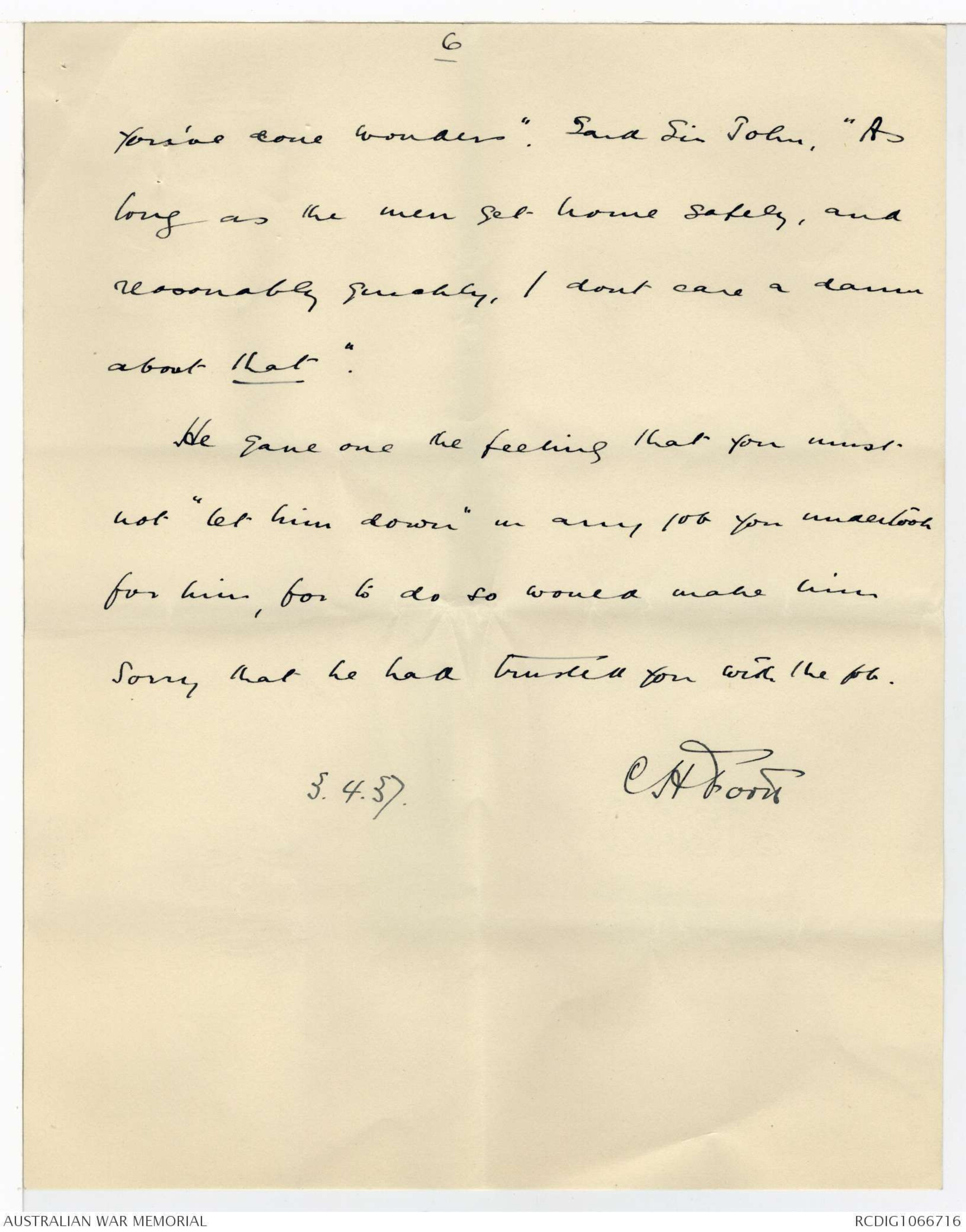
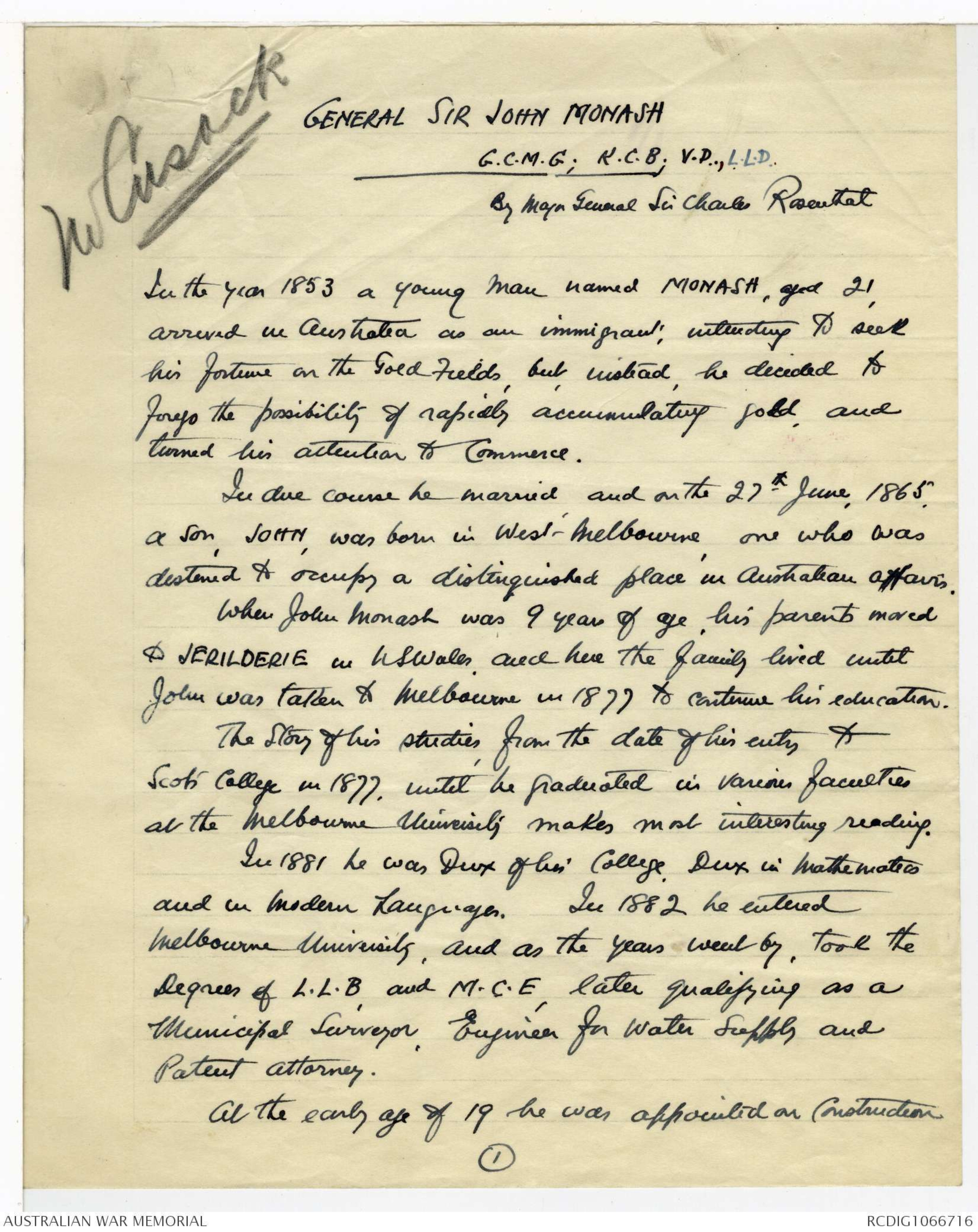
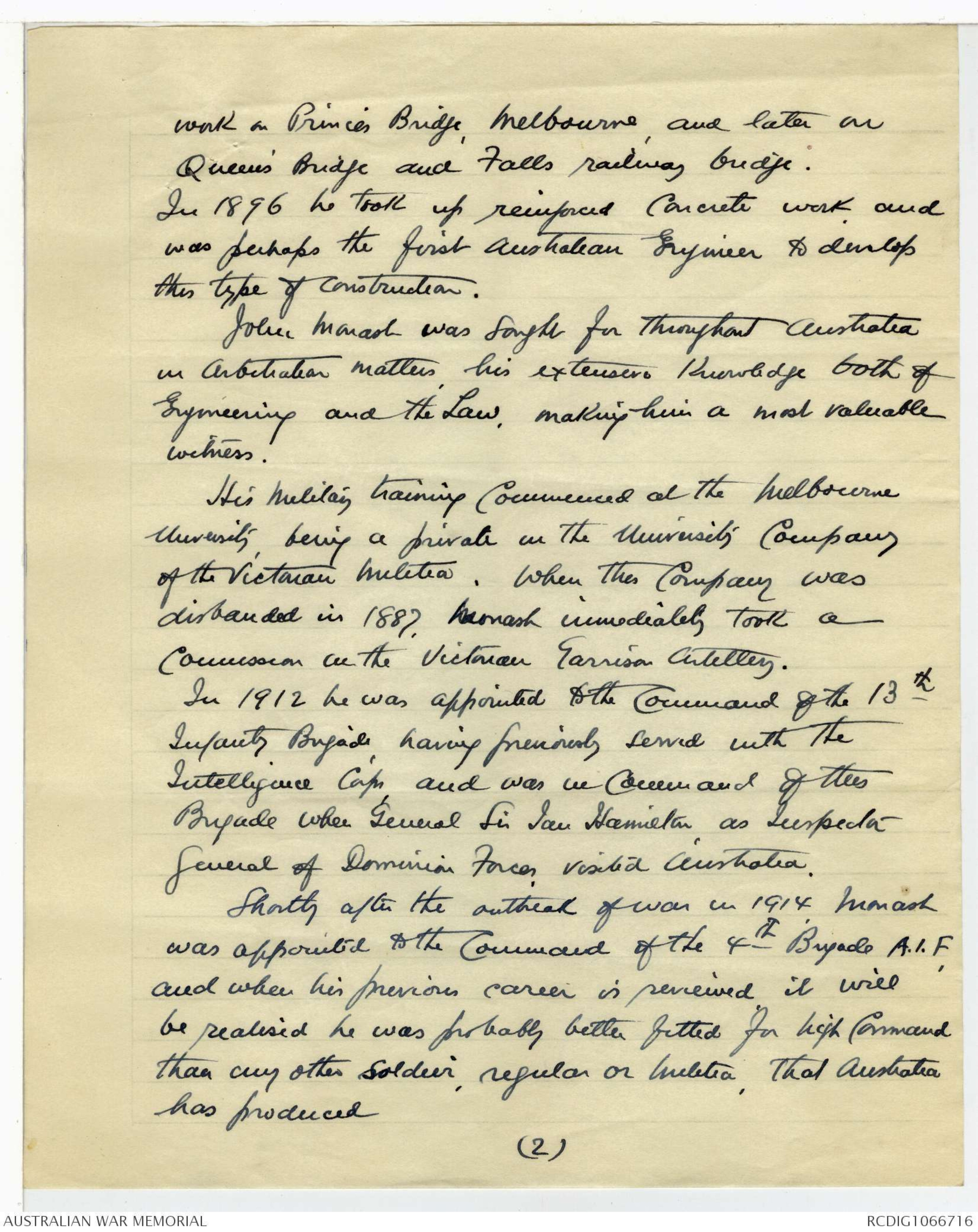
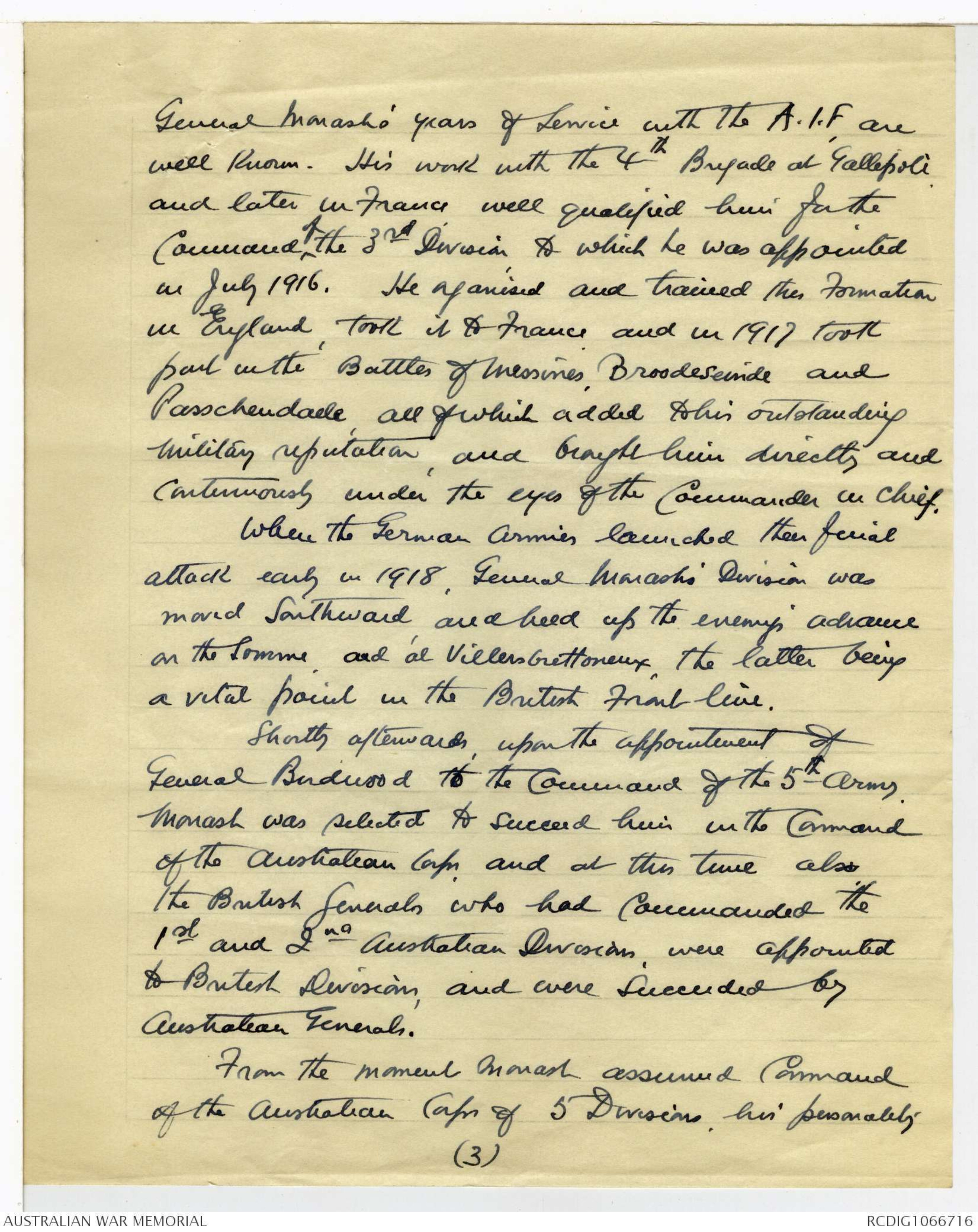
R.S.S.I.L.A.
NSW BRANCH
-7 APR 1937
RECEIVED
Brig Gen C H Foott
RECEIVED
Lytton
Upper Beaconsfield
3 April 1937.
The Editor of "Reveille"
Dear Sir,
It is a pleasure to be allowed to give
you a few notes on General Sir John Monash.
Your letter of 30th March only reached me
today and this cannot reach you until
the 6th at earliest, but I hope that it will be
in time. I should prefer that my name
did not appear.
Yours Sincere
C H Foott
JMC
Notes on General Sir J. Monash.
I first met him in 1909 or 1910, in his
capacity as Chairman of the Invention Board.
No one could fail to be impressed by his
grasp of detail, his infinite patience in
examining any idea put before him, and
his kindness towards inventors, even when
(as was often the case) their ideas were
valueless or chimerical. He would often
go to some trouble to explain to xxx inventors
just exactly why the invention failed ^to be of any use; he
would never allow them to be deluded
into further useless efforts by a
non-committal reply
Then, at
2
Then, at the War, those "who served closely
under him learned that his patience was
great, his kindness towards those who were
really trying was wonderful, and his grasp
of detail was immense.
Those whom he trusted, he trusted fully.
When he believed that they understood his
ideas ^his "appreciation", his plan, he left to them the carrying
out of detail. He never interfered unlesshe with his subordinates - not more often than
once - then,as a rule, he got another man for that
job. "No use keeping a dog, and doing
your own barking" was a saying of his.
To show how he let his subordinates run
3.
run their own show, let me mention the 7th of
August 1918. On that day ^after the Corps Conference, I had explainedtheir to my subordinates the plan, as far as
it affected them, the action to be taken, and
the part each was to play. Then, knowing that
there would be a busy night in front
of me, I turned in, about 4 p.m., for a sleep.
Later in the afternoon, General Monash, after
chaffing me on being able to sleep on a
hot afternoon, said "I was very glad to
see you, xxxxx X_____, for I knew that there was
one man, at any rate, whose mind was
at rest about his job of work."
He was always ready to "stick up"
4
up" for his subordinates, if other authority
tried to "deal it out" to them. A mistake made
in good faith never brought censure from
him, beyond a quiet explanation of what
one might have done. He was too large-minded
to lose his temper, or to get flurried, even
at the mistakes of others.
And, like all real leaders of soldiers,
he always kept before him, and before
his Staff, the comfort and well-being, so
far as it could be secured, of his troops.
Not enough credit has been given to
him for his great work in repatriating
the 300,000 Australians after the war.
5
People do not realise the difficulties
with which he had to contend. The men
were anxious to get home, there was every
chance of "trouble", owing to a lot of
misguided talk; shipping was scarce, xxx
and unsuitable; strikes delayed the
out-fitting of the transports; the French railway
system was hopeless, and there was
a constant itch of political interference
both from England and Australia.
But he stuck to his task. Once, in my
hearing - for I was very close to him in
those "Demobaust" days - a high Official
said "Monash, this job does you great
credit,
6
You've done wonders". Said Sir John, "As
long as the men get home safely, and
reasonably quickly, I dont care a damn
about that".
He gave one the feeling that you must
not "let him down" in any job you undertook
for him, for to do so would make him
sorry that he had trusted you with the job.
C.H Foott
3.4.37
[[*M Cusack*]]
GENERAL SIR JOHN MONASH
G.C.M.G; K.C.B; V.D., L.L.D.
By Major General Sir Charles Rosenthal
In the year 1853 a young man named MONASH, aged 21,
arrived in Australia as an immigrant, intending to seek
his fortune on the Gold Fields, but, instead, he decided to
forgo the possibility of rapidly accumulating gold, and
turned his attention to Commerce.
In due course he married and on the 27th June, 1865,
a son, JOHN, was born in West-Melbourne, one who was
destined to occupy a distinguished place in Australian affairs.
When John Monash was 9 years of age, his parents moved
to JERILDERIE in NSWales, and here the family lived until
John was taken to Melboume in 1877 to continue his education.
The story of his studies from the date of his entry to
Scots College in 1877, until he graduated in various faculties
at the Melbourne University makes most interesting reading.
In 1881 he was Dux of his College, Dux in Mathematics
and in Modern Languages. In 1882 he entered
Melbourne University, and as the years went by, took the
Degrees of L.L.B, and M.C.E, later qualifying as a
Municipal Surveyor, Engineer for Water Supply and
Patent Attorney
At the early age of 19 he was appointed on Construction
1
work on Princes Bridge, Melbourne and later on
Queen's Bridge and Falls railway bridge.
In 1896 he took up reinforced concrete work and
was perhaps the first Australian Engineer to develop
this type of construction.
John Monash was sought for throughout Australia
in Arbitration matters, his extensive knowledge both of
Engineering and the Law, making him a most valuable
witness.
His Military training commenced at the Melbourne
University being a private in the University Company
of the Victorian Militia. When this Company was
disbanded in 1887, Monash immediately took a
Commission in the Victorian Garrison Artillery.
In 1912 he was appointed to the Command of the 13th
Infantry Brigade having previously served with the
Intelligence Corps and was in Command of this
Brigade when General Sir Ian Hamilton, as Inspector
General of Dominion Forces visited Australia.
Shortly after the outbreak of war in 1914, Monash
was appointed to the Command of the 4th Brigade A.I.F,
and when his previous career is reviewed it will
be realised he was probably better fitted for high Command
than any other soldier, regular or militia, that Australia
has produced
(2)
General Monash's years of Service with the A.I.F, are
well known. His work with the 4th Brigade at Gallipoli
and later in France well qualified him for the
Command ^of the 3rd Division to which he was appointed
in July 1916. He organised and trained this Formation
in England, took it to France and in 1917 took
part in the Battles of Messines, Broodeseinde and
Passchendaele, all of which added to his outstanding
military reputation, and brought him directly and
continuously under the eyes of the Commander in Chief.
When the German armies launched their final
attack early in 1918, General Monash's Division was
moved Southward and heed up the enemy's advance
on the Somme and at Villers brettoneux, the latter being
a vital point in the British Front line.
Shortly afterwards, upon the appointment of
General Birdwood to the Command of the 5th Army,
Monash was selected to succeed him in the Command
of the Australian Corps, and at this time also
the British Generals who had commanded the
1st and 2nd Australian Divisions, were appointed
to British Divisions, and were succeeded &
Australian Generals.
From the moment Monash assumed Command
of the Australian Corps of 5 Divisions, his personality
(3)
 Maralyn K
Maralyn KThis transcription item is now locked to you for editing. To release the lock either Save your changes or Cancel.
This lock will be automatically released after 60 minutes of inactivity.